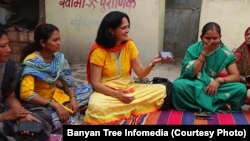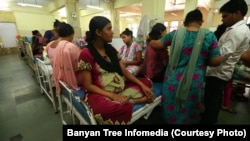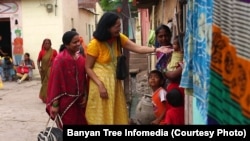The maternity ward and its waiting room at Mumbai's Sion public hospital deliver daunting challenges every day.
"They're extremely crowded, you know: 200 women waiting outside for us" and "no time to counsel them," Dr. Aparna Hegde recalled from her medical residency there in 1998.
Inevitably, some of the women would go back to Mumbai's slums untended – and unlikely to make another attempt to get prenatal care. Some would suffer complications and contribute to India's sobering toll of maternal and infant deaths, still among the world’s highest.
On average, "a woman dies in childbirth every 10 minutes in India. That is more than 50,000" a year, Hegde said grimly, citing statistics backed up by the World Health Organization.
To minimize those sorry outcomes, the Indian physician in 2008 dreamed up ARMMAN, a nonprofit organization devoted to aiding Indian mothers in poor urban and rural communities. It got off the ground in 2012, when Hegde was able to line up financial support. (ARMMAN, which means "wish" in Hindi, stands for Advancing Reduction in Mortality and Morbidity of mothers, children And Neonates.)
"Women don't have access to information. They don't know when to seek help" in pregnancy, in labor or after childbirth, Hegde said. "They don't know when to take their children to the hospital, so they often end up in emergencies. When in an emergency, there's no access to transportation, so they cannot reach the hospitals in time."
Friendly information source
ARMMAN provides key information to women and health care workers through programs such as Mobile Mitra, a free, automated phone service that sends twice-weekly messages to pregnant women and new mothers. ("Mitra" means "friend.")
"There are more phones in India than toilets," Hegde said, and many poor families have them.
Upon enrolling, a pregnant woman gives her due date and language preference. Targeted voice or video messages arrive with details on what to expect and what to do at each particular stage. For instance, it advises taking iron supplements early on to reduce the risk of anemia, a condition linked to problems such as preterm birth and newborn death.
ARMMAN also set up a mobile app – the Helpline for Emergency Response Operations (HERO) – that provides real-time information about which Mumbai hospitals have beds available in an intensive care unit and which blood banks have supplies of a needed type.
"In Mumbai and other cities, countless lives are lost by running from hospital to hospital trying to find an ICU" or blood, Hegde said. "Those precious minutes could be the difference between life and death."
Health aides visit homes
ARMMAN supplements these efforts with a program of home visits to pregnant women – both in Mumbai and in rural villages in Maharashtra state.
"The need for our services is [greater] in rural India," Hegde said. "The hospitals are very far. Transportation to the hospitals is very difficult. And when you go to the hospital, care is apathetic."
So, the program trains village women as community health aides, sending them on home visits to give counsel, take blood pressure and temperature readings, and collect blood samples for testing. "They go home to home and provide this care after work hours, and these entrepreneurs also earn money," Hegde said.
Using a smartphone application, the aides submit information on every mother and child they see, arranging referrals to health clinics.
Identifies with patients
The physician identifies with many of her patients, having grown up in "low middle-class" circumstances in Mumbai. But Hegde also received a strong education "and it didn’t cost me any money," she said. India makes low-cost education available to most students, and the government pays all the costs – even medical school tuition – for exceptional students.
She earned her medical degree from Mumbai University and got advanced training in the United States at Stanford University. More recently, at the Cleveland Clinic Florida, the doctor learned the latest in urogynecology and pelvic floor reconstructive surgery.
India spends frustratingly little on public health, including on preventive measures, Hegde charges, adding that its privileged classes have access to private health care that "could rival anywhere in the world."
She’s determined to address the inequity. "Access to preventive care information and access to health care is a fundamental right that I would like every woman and child [to] have," she said.
When Hegde speaks, her words rush out in a torrent. She has so much to do – and ARMMAN is just part of it. The full-time physician also is bringing new diagnostics and treatments to India through the Urogynecology and Pelvic Health Institute, which she co-founded and directs in Gurgaon, an industrial city 32 kilometers or 20 miles southwest of New Delhi. UPHI is the first center of its kind in India, recognized for excellence in its clinical, academic and research work.
Hegde has had no time for marriage or children of her own. "ARMMAN is my baby," she joked.
But she was flattered when, while visiting a village, she met a tiny girl cradled in her mother's arms. The baby’s name? Mitra.
Enlisted in global partnership
ARMMAN's efforts expanded to all of Mumbai’s public hospitals and slum communities in November after the international Mobile Alliance for Maternal Action (MAMA) selected the organization as its implementing partner in India. MAMA – housed at the United Nations Foundation, with partners including the U.S. Agency for International Development, the BabyCenter parenting website and the Johnson & Johnson Foundation – supports similar programs in Bangladesh and South Africa. It's poised to do so in Nigeria.
The outreach also is fueling a newfound sense of strength among poor women vulnerable to being undereducated, or treated as chattel and married off as young teenagers, Gagnaire and Hegde said.
Health aides "who've been signing other women up – it’s become empowering for them," Gagnaire said. "Their stature in the community has increased. In the past, if a woman went into labor late at night, she would just give birth at home. Now this [aide] will help arrange transport."
And the home visits and phone support are "leading to a change in family dynamics," Hegde added. "... These women never had anyone to listen to them. Now, they are coming into their own."






